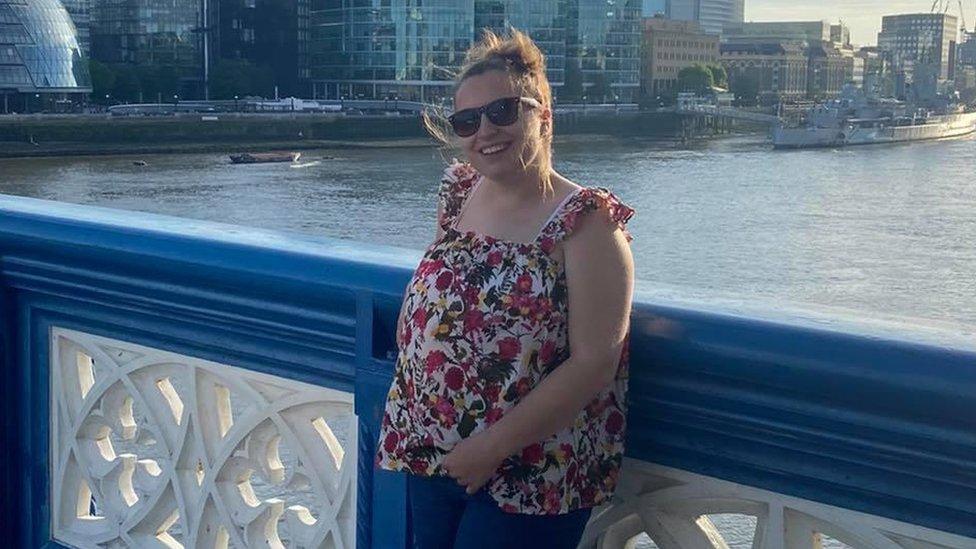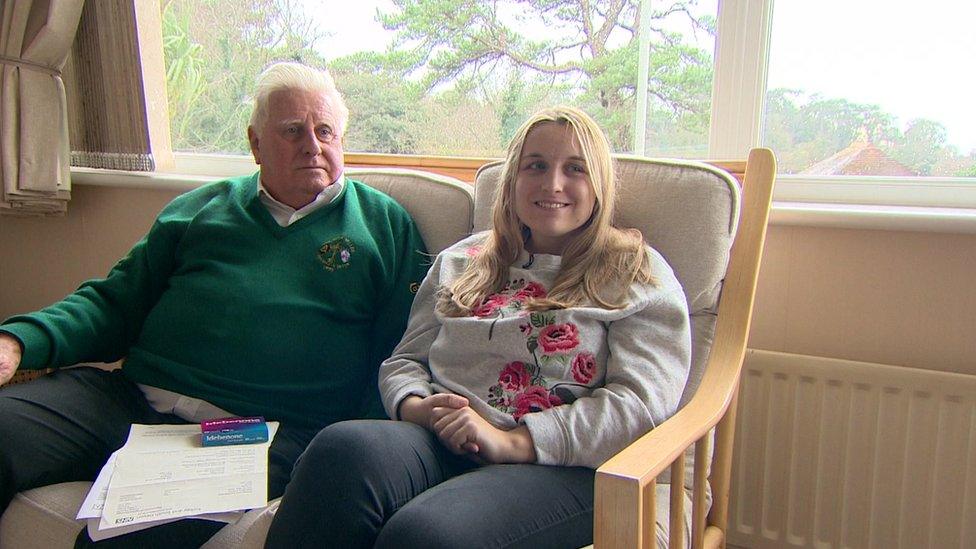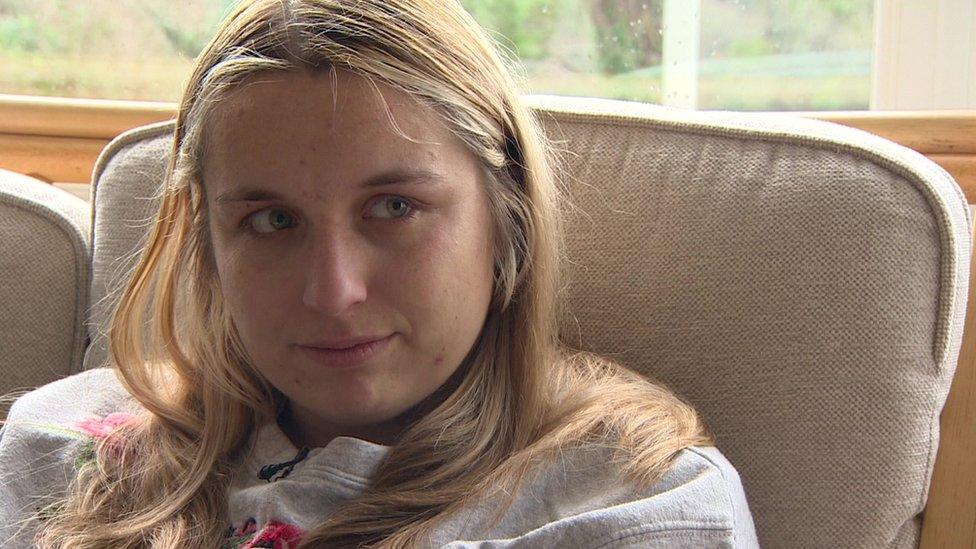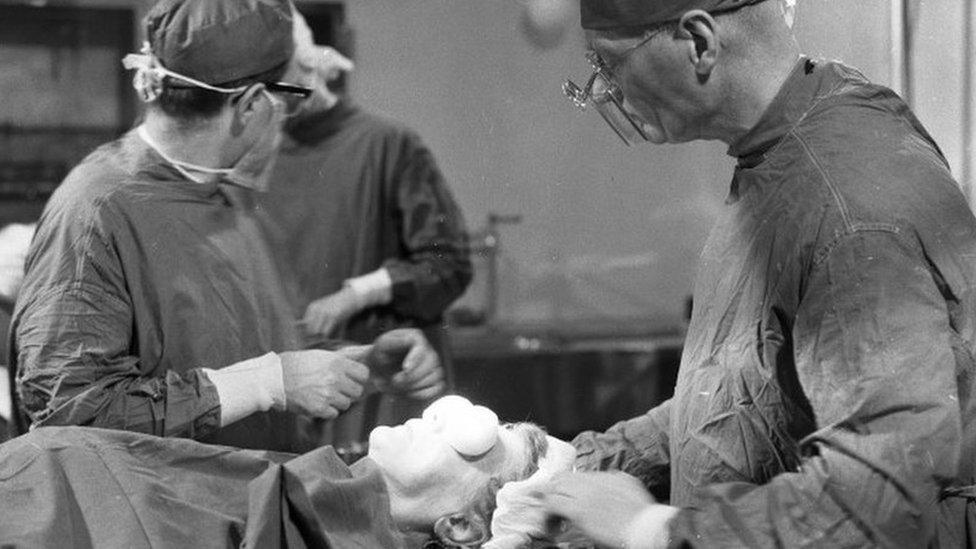Drug for LHON not available on NHS 'means everything'
- Published

Mary Clifford suffers from Leber's Hereditary Optic Neuropathy, a genetic condition that means she could lose her sight
A woman with a genetic condition that means she could go blind is calling on the NHS to allow her access to a drug she says is stopping her from losing her sight.
Mary Clifford started taking the drug when her sight began to deteriorate and said it had stopped the progression of her condition "in its tracks".
She is having to buy a generic form of the drug from a supplier in the USA.
NHS England said there was "not enough evidence" to make the drug available.
Miss Clifford, from Torquay, Devon, suffers from Leber's Hereditary Optic Neuropathy (LHON), a rare condition that is passed on through the maternal line.
The 28-year-old's family had never heard of the disease before her mother started showing symptoms four years ago and then very quickly lost her sight in both eyes.
Miss Clifford was tested following her mother's diagnosis and found to be a carrier.
In September, she started getting migraines and fuzziness in her left eye.

What is Leber's Hereditary Optic Neuropathy (LHON)?
LHON is a maternally-inherited genetic disease caused by a mutation in the mitochondrial DNA
It affects 1 in 30,000 people - about 2,000 in England
LHON usually starts with blurring of central vision in one or both eyes
The onset of symptoms is usually followed by rapid progression to blindness
Not everyone who is a carrier of LHON will lose their sight or develop symptoms
Male carriers of LHON are four to five times more likely to lose their vision than female carriers
Source: NHS England, Prof Patrick Yu Wai Man

"I had to ring the emergency eye department who kindly saw me, probably two days later, and then he clarified that it was the Leber's manifesting in my left eye," she said.
"I was thinking 'what do I do? How do I tell people?'"
The family had a supply of a drug called Raxone/Idebenone, which was left over from her mother's treatment.
Her father, Paul Clifford, said: "I then contacted [Mary's doctor] and said 'I do have a supply of this Raxone at home, should I give it to her?' and he said 'yes by all means give it to her, that's the only thing we can do to stop it'.
"Miracles upon miracles, two months later we go back to see the doctor who wanted to check her out again and it had stopped, it had stopped it in its tracks and in actual fact he said... the optic nerve was looking almost back to normal."

Miss Clifford's father, Paul, said LHON had a "devastating impact" on his family
Miss Clifford said when they ran out of the drug, her eyesight began to deteriorate and get cloudy again but they were able to find a supplier in America,
"It [the Idebenone] means everything to me at the moment," said Miss Clifford.
"It means that I can see my nephew grow up into the little boy that he's become, I can see my friends and my other family members. I can keep my job."
Mr Clifford said: "Unfortunately NHS England refused to allow it to be on prescription - you can get it on prescription in Scotland, Wales and Northern Ireland so she was advised 'look Mary if you go to Wales in Cardiff, there's a professor there that will issue you and will give you the drug'.
"Which is 100 miles north of here and we said well this is ridiculous, why can't NHS England do it?"
'Absolutely gutted'
Mr Clifford said a case was put to the Devon Integrated Care Board (ICB) but the family was told it would not be cost effective.
He said the family were buying the drug for about £270 for a 12-week supply for the supplier in the States.
"I'm just absolutely gutted, firstly when my wife went - she's younger than me and she's very active and she did everything for the family so our lifestyle changed overnight and it was devastating," he said.
"We just wanted to make sure that the children were OK and when Mary got it that was it, we both fell apart. So I've got to do everything possible to make sure Mary doesn't go the same way as my wife went.
"It's a life-changing drug."

MIss Clifford is calling on NHS bosses to reconsider the decision not to give her the drug
Consultant ophthalmologist and Cambridge University researcher Prof Patrick Yu Wai Man said LHON was a "devastating disease" that had "huge" implications for families.
"There is no doubt that there is a sufficient body of evidence that Idebenone can influence the progression of this disease," he said, adding the "same evidence, same data and same expert evidence" had allowed the drug to be prescribed for the condition in three out of four of the countries in the United Kingdom but not in England.
A spokesperson for NHS England said: "We've carefully reviewed the evidence prepared by NICE to treat visual impairment in people with LHON.
"We've concluded that there's currently not enough evidence to consider making the treatment available, but it is open for a patient's doctor to ask for a review of the policy."
Russell Wheeler from the LHON Society said: "If it works for people in Scotland it works for people in England.
"I know people who have taken this having been classed as legally blind, who after six months have been able to drive again but equally I do know people who have taken it diligently and not seen any improvement whatsoever.
"We need this now and Mary needs this straight away and she should not have to pay for it, it's fundamentally wrong."
Miss Clifford added: "Why can't you just give me a chance because my consultants have all proved that this drug is working because my tests that I undergo every time I go in and even my what I call my work family, they can see the actual improvement in taking the drug.
"I'm not doing this just for me, I'm doing it for the people who are younger than me that are fighting for it as well."

Follow BBC News South West on Twitter, external, Facebook, external and Instagram, external. Send your story ideas to spotlight@bbc.co.uk, external.
Related topics
- Published7 June 2022

- Published20 June 2018

- Published30 April 2012
smith.jpg)
- Published20 February 2012